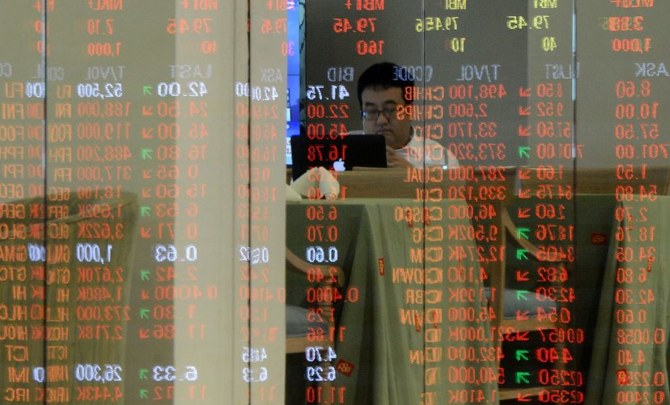MANILA/SINGAPORE: The Philippine Stock Exchange closed indefinitely on Tuesday while currency and bond trading were suspended, the first market shutdowns worldwide in response to the coronavirus, with authorities citing risks to the safety of traders.
The shutdown comes after some bourses around the world closed trading floors or paused trade after withering falls in market value, but it is the first blanket market halt.
And while it was done for health reasons, amid a broad lockdown in the Philippines, it raises the prospect other exchanges may follow and has drawn analysts’ attention.
“Given the unprecedented speed of the slump in equity prices, it has been suggested that stock exchanges might be closed soon if things don’t turn around,” research house Capital Economics said in a note on Tuesday.
AdMacro research head Patrick Perret-Green had also raised the possibility in a note issued over the weekend, before the Philippines move.
“We have seen it before. I believe we could see it again,” he said. “Governments do not need or want the added stress and distraction at this time.”
The Philippine Stock Exchange said trade was suspended until further notice “to ensure the safety of employees and traders,” amid a broader national lockdown.
National Treasurer Rosalia de Leon cited the lockdown as the reason for the suspension of fixed income trade. Currency trading is to resume on March 18.
In Malaysia, where a similar lockdown comes into force on March 18, the securities regulator said all capital markets will operate as usual.
CME Group Inc. last week shut its storied trading floor in Chicago, to reduce large gatherings, and Mideast bourses have taken similar measures, though electronic trade remains available.
Kuwait’s exchange has suspended trade at least twice this month, after daily falls of more than 10 percent, while in Indonesia, Jakarta’s bourse has introduced new circuit breakers which halt trading for half an hour if the main index falls 5 percent.
That comes amid a swathe of short-selling restrictions in markets from South Korea to Italy and Spain.
Capital Economics, however, said closures are ineffective at salving investor sentiment. The consultancy expects — as in the Philippines — health reasons to be invoked should other bourses shut.
“On the rare occasions when stock markets have been shut in the US in the past, it has usually only been for practical reasons, such as after 9/11, rather than as means of trying to restore confidence ... (It) might not work in any case.
“Investors might end up selling anything else they could if they needed to raise cash in a hurry.”
Global markets are in meltdown as the pandemic spreads, with roughly $14 trillion in shareholder value erased and even safe assets such as gold have been sold to cover losses.
The Philippines benchmark index fell 8 percent on Monday and is down 20 percent for March so far, already its worst since October 2008.
“Eventually they will open,” said Mathan Somasundaram, market portfolio strategist at stockbroker Blue Ocean Equities in Sydney.
Philippines first country to suspend all financial markets as coronavirus spreads
https://arab.news/c2rcf
Philippines first country to suspend all financial markets as coronavirus spreads

- Shutdown comes after some bourses around the world closed trading floors or paused trade
- Raises the prospect other exchanges may follow
Saudi Finance Ministry acquires 86% stake in Binladin Group through debt-to-equity conversion

RIYADH: The general assembly of Binladin International Holding Group has approved a capital increase through the conversion of existing debt into equity, a move that results in the Saudi Ministry of Finance acquiring an 86 percent ownership stake in the company, according to a report by Al-Arabiya.
The decision marks a significant step in restructuring the group’s financial position and reflects shareholder confidence in the company’s long-term strategy and operational recovery.
In a statement cited by the Al-Arabiya report, Binladin Group’s board of directors said the approval underscores trust in the company’s future direction and reinforces its development and growth objectives.
Under the approved arrangement, outstanding financial obligations will be settled through the issuance of new shares, allowing the company to substantially reduce its debt burden and strengthen its balance sheet.
As a result, the Ministry of Finance will become the group’s majority shareholder, aligning the government directly with the company’s growth trajectory while supporting its financial stability.
The transaction follows earlier measures taken by the Ministry of Finance to stabilize the group’s financial structure.
Previously, Saudi Arabia’s National Debt Management Center announced the successful completion of a syndicated loan facility on behalf of the ministry, arranged with a consortium of local and international banks. The facility totaled approximately SR23.3 billion ($6.2 billion) and was part of a broader framework to address the company’s liabilities.
The Ministry of Finance had earlier outlined a series of coordinated steps with Binladin Group to settle outstanding cash obligations to banks and restructure the company’s financial commitments. These measures were designed to restore operational stability and enable the group to continue executing its portfolio of large-scale construction projects.
The move is seen as a continuation of the government’s broader support for the construction and infrastructure sector, a key pillar of Saudi Arabia’s economic transformation agenda under Vision 2030.
The restructuring is expected to help ensure the timely completion of strategic projects, safeguard employment, and enhance the sector’s attractiveness to investors.
Commenting on the development, Mohammed Al-Tayyar, a political economy researcher, said the capital increase through a debt-to-equity swap significantly strengthens Binladin Group’s financial standing. He noted that the transaction is likely to bolster investor confidence, improve governance and transparency, and open up new opportunities for sustainable growth as the company moves forward under a more stable financial framework.












